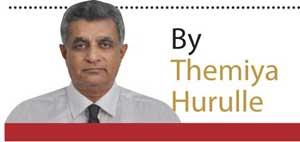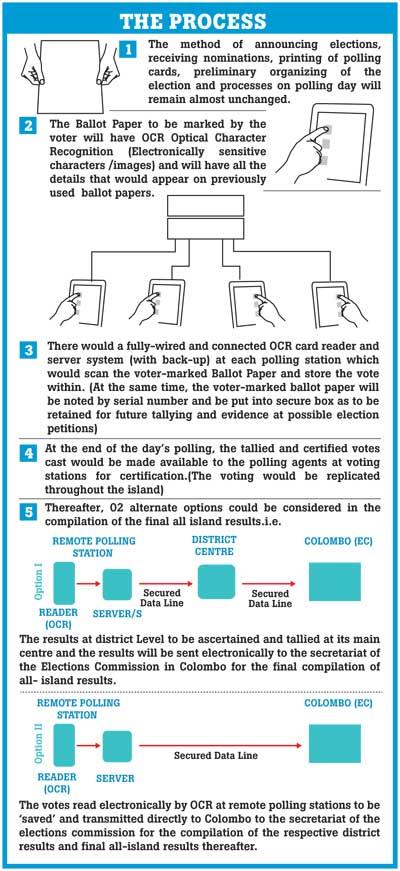
The CORVID-19 virus pandemic, evolving developments in Information Communication Technology (ICT) , the need to speed up processes, save time and financial resources of the Government and the people requires that the present method of conducting elections (and Referendums if necessary) be looked at anew by the Government and the Elections Commission.
THE PRESENT
The manual method of voting and counting in Sri Lanka has been practised since universal franchise was granted. This uses vast amounts of financial resources and deployment of a large number of government officials. The voters, candidates, political parties too comprise a vast array of stakeholders who need to devote much time and money at elections.
Although the matter of introducing Electronic Voting (e-voting) has been discussed, little progress is seen due to concerns of stakeholders on its confidentiality, security, ease of operation etc. While such concerns and suspicions are understandable, this should not deter Government and the Election Commission to arrive at a more modern and economical way of conducting elections.
 HISTORY OF VOTING
HISTORY OF VOTING
Voter are used to the process of going to the local polling station, being identified and marking the ballot paper with preferences and inserting the marked ballot paper into the ballot box. As such, a future e-voting system should keep this habit in mind to make them ‘feel’ the voting.
THE NEED
If so, how does one introduce e-voting under these circumstances while retaining the basic process of manual voting at polling stations around the country?
HYBRID e-VOTING
As such, is suggested that a secure, tried and tested hybrid system of manual voting combined with electronic recording of votes and computation of Election results be considered for study and implementation. This would mean that while the manual method of voting is retained, the processes thereafter will be entirely electronic and digital which will minimize the deployment of vast numbers of, Polling Booth Officials, Counting Officers, Police Officials, Party and Candidates’ Agents who have to work for many days continuously in uncomfortable conditions.
THE PROCESS
1. The method of announcing elections, receiving nominations, printing of polling cards, preliminary organising of the election and processes on polling day will remain almost unchanged.
2. The Ballot Paper to be marked by the voter will have Optical Character Recognition (OCR) Electronically sensitive characters /images and will have all the details that would appear on previously used ballot papers.
3. There would a fully-wired and connected OCR card reader and server system (with back-up) at each polling station which would scan the voter-marked Ballot Paper and store the vote within. (At the same time, the voter-marked ballot paper will be noted by serial number and be put into secure box as to be retained for future tallying and evidence at possible election petitions)
4. At the end of the day’s polling, the tallied and certified votes cast would be made available to the polling agents at voting stations for certification. (The voting would be replicated throughout
the island).
5. Thereafter, two alternate options could be considered in the compilation of the final all island results.i.e.
I.The results at district Level to be ascertained and tallied at its main centre and the results will be sent electronically to the secretariat of the Elections Commission in Colombo for the final compilation of all- island results.
II.The votes read electronically by OCR at remote polling stations to be ‘saved’ and transmitted directly to Colombo to the secretariat of the elections commission for the compilation of the respective district results and final all-island results thereafter.
POSTAL VOTING: This is done a few weeks prior to the main election, could too have the e-voting process as mentioned above .In such an instance, government departments and workplaces would be the polling stations (where officials who will be involved in conducting the main election later on) would have the opportunity to cast their votes in advance.
ABSENTEE VOTING: Since all voting processes would be digital and electronic the matter of absentee voting from overseas could be considered for the future. This would allow Sri Lankans and Sri Lankan Dual citizens overseas to exercise their franchise for which the prevailing legislation will require to be amended.
Graphical presentations:
Option I
Remote Polling Station District Centre Colombo (ec)
Secured data line secured data line Reader server/s
(Ocr)
Option II
Remote Polling Station Colombo (ec)
Secured data line Reader server (Ocr)
The author is former Member of Parliament (Anuradhapura District) and former member, North-Central Provincial Council
 The CORVID-19 virus pandemic, evolving developments in Information Communication Technology (ICT) , the need to speed up processes, save time and financial resources of the Government and the people requires that the present method of conducting elections (and Referendums if necessary) be looked at anew by the Government and the Elections Commission.
The CORVID-19 virus pandemic, evolving developments in Information Communication Technology (ICT) , the need to speed up processes, save time and financial resources of the Government and the people requires that the present method of conducting elections (and Referendums if necessary) be looked at anew by the Government and the Elections Commission. HISTORY OF VOTING
HISTORY OF VOTING